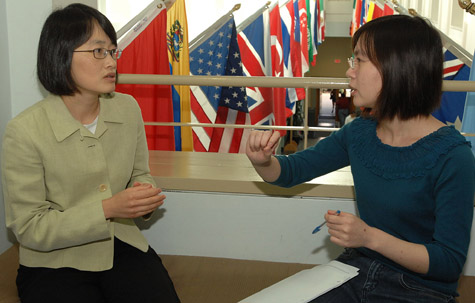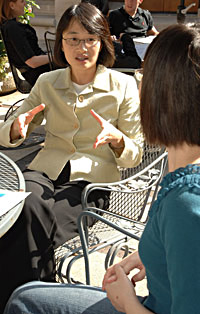
David Kilper
Lingxiu Dong, PhD (left), associate professor of operations and manufacturing management, talks with Xiaole Wu, a doctoral student in supply chain management. “I consider myself lucky that I have the opportunity to work in the profession that I am very passionate about,” Dong says, “and I am proud that I am a member of the prestigious Washington University, one of the top schools in the nation. It reminds me that I am fully surrounded by some of the top brains with kind hearts every time when I learn from my colleagues through research projects or discussions on topics from academic to culture, history or current events.”
Growing up in Beijing, Lingxiu Dong, PhD, wanted to be a computer scientist, just like her mother and father were. She thought they had the “coolest profession.”
Then Dong went to college and discovered computer graphics and its use in fractal geometry and artificial intelligence. She thought that was “really cool,” but decided she needed a solid foundation in mathematics first. So, she left Beijing in 1993 for a two-year master’s program at Georgia Tech.
“I passed the qualifying exam to be a PhD candidate in math,” says Dong, associate professor of operations and manufacturing management at Olin Business School, “but then I really changed my mind!”
Instead of pursuing a doctorate in mathematics, Dong felt the practical calling of her undergraduate training as an engineer.
“I realized math was too abstract,” she says. “I wanted to go back to an engineering type of study.”
At Georgia Tech, Dong made friends with many students in industrial and systems engineering. “And what they were doing was very cool,” Dong says.
“They do a lot of math models, simulations and coding to implement ideas into software that companies can use. That is really the coolest!”
As a doctoral student at Stanford University’s Department of Management Science and Engineering, Dong was able to pursue all of her interests, from the abstract to the practical.
“You can apply math knowledge to designing algorithms and making things more efficient,” Dong says.
Operations management “can change and help companies make decisions more efficiently. That’s very nice, it makes an impact, and it’s very real.”
Coolest of the cool
Dong is passionate about her research, teaching and making a difference in real-world business practices. They all revolve around supply chain management, which she believes is a fast-growing field of increasing importance to many industries.
Dong explains a supply chain: “It’s the process of delivering goods or services all the way from the beginning upstream suppliers all along the way down to the consumer. Along the way, you have different companies and parties adding value and incurring costs, so we need to control costs and hopefully add value at every step of the process.”
In the global economy, Dong says, supply chains are like spider webs. Supplies or components for one product could originate in several different countries, be manufactured elsewhere, and ultimately delivered and sold worldwide. Dong’s research seeks solutions to problems managers face when juggling the links in this complicated chain.
She uses mathematical models to capture the key factors that affect the decision-making process in supply chain management. By figuring out how factors such as currency exchange risk, labor costs and transportation costs interact, Dong finds ways to make the supply chain more efficient and hedge risks.
“After deriving those properties from the abstract model, I think, how am I going to communicate that in a intuitive way to the practitioners? How can I deliver meaningful, insightful messages to practitioners?” she says.
That’s where teaching comes in. It allows her to share her research and apply it to real-world cases.
Dong says, “I think this is the best job in the world.”
Multidisciplinary research
“Ling is passionate about her research and is an excellent collaborator,” says Chakravarthi Narasimhan, PhD, the Philip L. Siteman Professor of Marketing, who worked on a paper with Dong.
“She comes up with new ideas and is willing to debate that with her co-authors so that the best ideas rise to the top,” Narasimhan says.
The complex nature of supply chain management involves many different disciplines, from marketing to finance to operations and accounting. Dong likes the multidisciplinary approach to solving problems and working with colleagues at Olin.
Hong Liu, PhD, associate professor of finance, published a paper with Dong in one of the top journals in the operations management field.
“What impressed me most while working with her on the paper is that Ling is very careful with all the results we stated in the paper, always at least triple-checking that each claim is correct, no matter how complicated the computation is,” Liu says. “In addition, whenever additional work became necessary, she always volunteers to take on the extra work.”
In her father’s footsteps
Dong credits her father for instilling her determined work ethic.

David Kilper
Lingxiu Dong, PhD, says she loves the collegial atmosphere in Simon Hall.
“Many things that my father told me when I was in elementary school or high school, I only started to truly understand the truth in them when I left home and went to college and came to the U.S.,” she says.
She remembers her father telling her: “There is no easy thing or difficult thing in the world. If you don’t put in effort, everything is difficult. If you put in effort, nothing is too difficult.”
Dong’s father was a visiting professor at Stanford for two years beginning when Dong was 7. She says it was the first American university she knew of and that it was a great pleasure to do her doctoral work there because it felt like she was following in his footsteps. She says he was her role model.
There have been other role models, too.
“Throughout my school years and career, I have benefited tremendously from wise advice from professors, fellow students and colleagues,” Dong says. “In particular, in my PhD years, I learned a lot from my doctoral dissertation adviser, Professor Hau L. Lee (PhD), not only about how to do research, but also work ethic, and the passion and persistence world-class scholars must put in their work.
“I also advise several doctoral students,” she says, “and I try to give that kind of experience to my students.”
Industry vs. academia
During her summers in graduate school, Dong interned in the Hewlett Packard labs.
“I saw what it was like to deliver quick solutions,” she says. “I always wanted more time to stop and think about problems — like what are the drivers, key tradeoffs and most effective solutions?”
The experience confirmed she belonged in academics.
“The nice part of academics is that you have the luxury to think and find a solution and that is very satisfying,” Dong says.
A research project in supply chain management can take two or three years to complete. Dong says persistence and patience are the keys to solving problems she tackles in her research.
“I always thought I worked hard, but my colleagues here at Olin work really hard, and I have to work harder. My senior colleagues, Panos Kouvelis (PhD, the Emerson Distinguished Professor of Operations and Manufacturing Management), Yossi Aviv (PhD, the Dan Broida Professor of Operations and Manufacturing Management) and many other professors at Olin Business School set good examples for me.”
Despite all the hard work, Dong says she thrives in academia and loves the collegial atmosphere in Simon Hall.
Fast facts about Lingxiu Dong
Joined WUSTL in: 1999
Family: Husband, Walter, who works in the health-care industry, and two sons, Bryson, 6, and Aston, 1. Dong’s parents and sister, a computer programmer, live in Beijing.
Hobbies: “I used to have hobbies before I had kids,” she says. “Their hobbies will be my hobby for the next 10-15 years!”